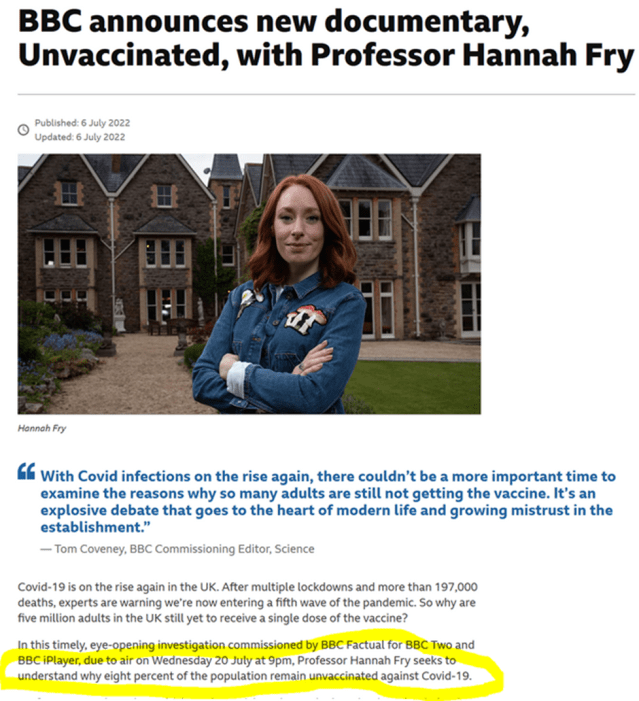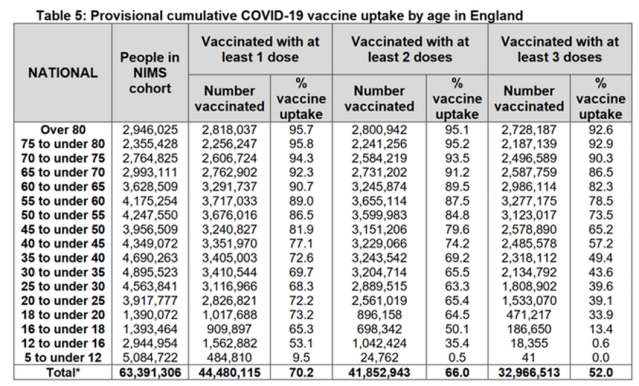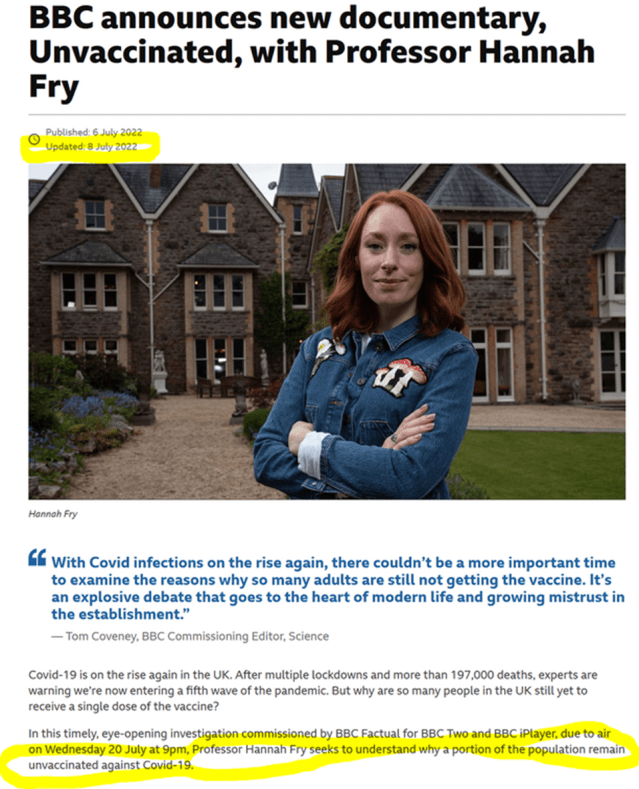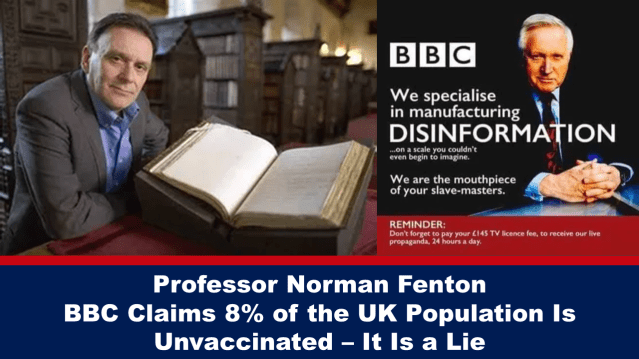Professor Norman Fenton: BBC Claims 8% of the UK Population Is Unvaccinated – It Is a Lie
BBC’s Prof Hannah Fry claims 8% of the UK’s population is unvaccinated. But this is a lie. UK Health Security Agency’s (“UKHSA’s”) latest report shows that almost 30% of the population, of all ages, has not had even one dose of Covid injections, with 20% of the population over the age of 18 being vaccine free.
Why is this important? Because accurate estimates of the proportion of people who are unvaccinated is critical in determining both vaccine efficacy and vaccine safety. BBC’s lie clearly has a major impact in exaggerating claims about “vaccine” safety and efficacy.
“Within 2 hours of me posting this article and tweeting it, the BBC updated the article (see below) so it’s just as well I grabbed a screenshot of the original,” wrote Professor Norman Fenton.
A new BBC documentary (hosted by mathematician Prof Hannah Fry) “seeks to understand why eight per cent of the population remain unvaccinated against Covid-19.”

But, as pointed out by Clare Craig, the latest UKHSA Covid-19 surveillance report (dated 7 July 2022) reports something very different: almost 30% of the population of England eligible for the vaccine has not had a single dose of the vaccine. Even if we ignore those aged under 18 it is almost 20% without a single dose and almost 40% who have not had 3 doses.

As we have shown in several of our own research articles, (see for example HERE and HERE) accurate estimates of the proportion of people who are unvaccinated is critical in determining both vaccine efficacy and vaccine safety. To see why suppose, for illustration, we know that in a given period there were one million people in a specific age group of whom one thousand died. Then the overall all-cause mortality rate is 1 in 1000. Suppose we know that 800 of those who died were vaccinated while 200 were not. Then:
- If the true proportion of unvaccinated is 10% that means 200 out of 100,000 unvaccinated died (that’s a mortality rate of 1 in 500), while 800 out of 900,000 vaccinated died (that’s a mortality rate of 1 in 1,125). So, the mortality rate in the unvaccinated is much higher than that of the vaccinated.
- If the true proportion of unvaccinated is 30%, that means 200 out of 300,000 unvaccinated died (that’s a mortality rate of 1 in 1,150), while 800 out of 700,000 vaccinated died (that’s a mortality rate of 1 in 875). So the mortality rate in the unvaccinated is much lower than that of the vaccinated.
Our reports showed clearly that many of the claims by the Office for National Statistics (ONS) about vaccine efficacy and safety are based on flawed data, which includes not just misclassifying some of those who die shortly after vaccinated as ‘unvaccinated’, but also underestimating the true proportion of unvaccinated.
The 8% unvaccinated claim by the BBC is clearly wrong and it clearly has a major impact in exaggerating any claims about vaccine safety and efficacy. Having previously co-presented a BBC documentary with Hannah Fry, I am well aware of the extent to which what presenters say is scripted by others. So I’d be interested to know if Hannah is comfortable presenting such obviously inaccurate statistics.
Update: within 2 hours of me posting this article and tweeting it the BBC updated the article. It now says Hannah Fry “seeks to understand why a portion of the population remain unvaccinated against Covid-19.” So, a small success of sorts, but how about an apology by the BBC for misleading the public again and also an explanation for how they came to get it so wrong. Who are the ‘experts’ they relied on for the data and are they the same ‘experts’ who will be scripting the programme with a biased narrative?

The above is the article BBC wants “to understand why 8% of the population remains unvaccinated against Covid” republished from Prof. Norman’s website HERE.
About the Author
Norman Fenton is a Professor of Risk Information Management at the Queen Mary University of London and a Director of Agena, a company specialising in critical systems risk management. He is a mathematician by training whose current focus is on critical decision-making and, in particular, on quantifying uncertainty using causal, probabilistic models that combine data and knowledge (Bayesian networks). The approach can be summarised as “smart data” rather than “big data.” Applications include law and forensics (he has been an expert witness in major criminal and civil cases), health, security, software reliability, transport safety and reliability, finance, and football prediction.
Featured image: Source for the image on the right, Exposing the Broadcasting Bias of the BBC

This article has been archived for your research. The original version from The Exposé can be found here.



